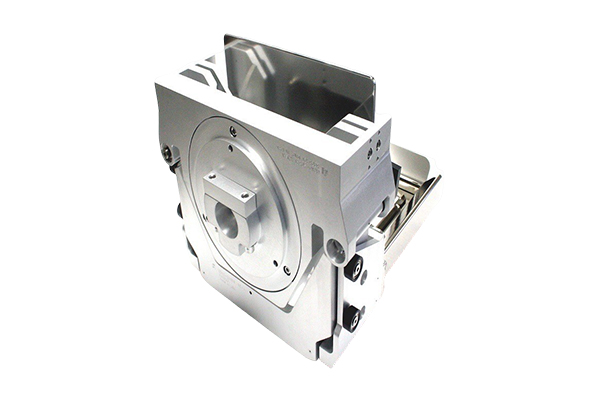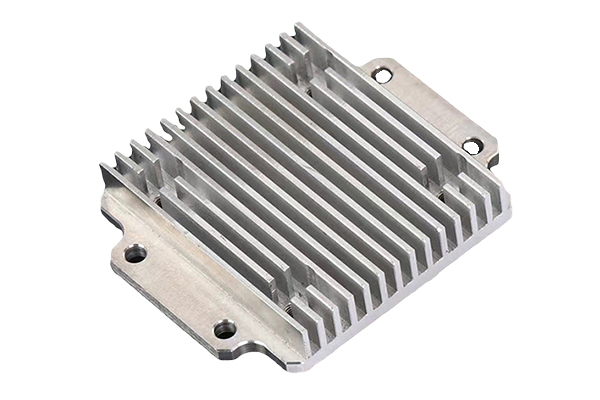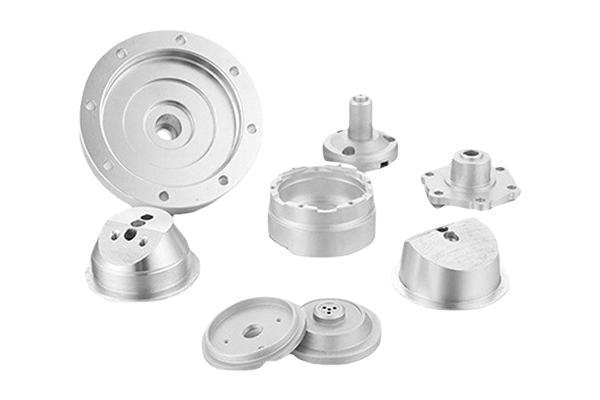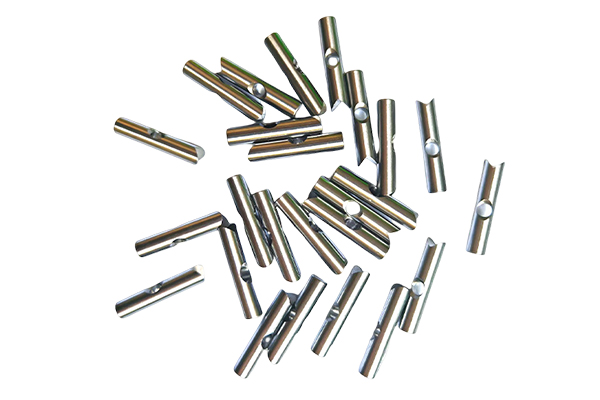How does CNC machining promote the development and innovation of precision manufacturing in many fields?
Release Time : 2025-04-28
With the advancement of science and technology, numerical control machinery (CNC) machining has become an indispensable part of modern manufacturing. It uses computer-controlled machine tools for precise operation and is widely used in industrial machinery and equipment, medical equipment, precision instruments, electronic equipment, automotive industry, various automation equipment, military industry, shipbuilding, aviation, metallurgy and other fields. CNC machining not only improves production efficiency and product quality, but also brings unprecedented design freedom and technological innovation to all walks of life.
First of all, the biggest advantage of CNC machining lies in its extremely high precision. The micron-level precision that is difficult to achieve with traditional manual operation can be easily achieved on CNC machine tools. This is especially important for industries that require extremely high precision requirements, such as the manufacture of key components in the aerospace industry or the production of micro parts in medical devices. High precision means higher reliability and longer product life, which is directly related to the performance of the final product. For example, in medical devices such as pacemakers, any slight error can lead to serious consequences, and CNC machining can ensure that every component meets strict standards.
Secondly, CNC machining technology has greatly promoted the manufacture of parts with complex shapes. With the help of advanced CAD/CAM software, engineers can design complex geometric shapes that were unimaginable in the past and turn them into reality through CNC machines. This ability is essential for innovative design, especially in the electronics and automotive industries. Take smartphones as an example. Their internal structure is compact and contains multiple complex components. Only through CNC machining can these miniaturized and integrated components fit perfectly. Similarly, in the automotive industry, the application of lightweight materials and the design of streamlined bodies also rely on CNC machining to complete fine cutting and forming work.
In addition to precision and complexity, CNC machining can significantly improve production efficiency. Since the entire process is automatically controlled by a computer program, errors and downtime caused by human factors are reduced. In addition, a CNC machine can run continuously without supervision, achieving 24-hour uninterrupted production. This is a huge advantage for industries with large-scale production, such as automobile manufacturing and electronic product assembly. At the same time, the ability to quickly change tools and adjust parameters allows the production line to quickly switch product types according to order requirements, enhancing the flexibility and market responsiveness of the enterprise.
Environmental protection is also a highlight of CNC machining. Compared with traditional cutting methods, CNC machining uses a more efficient cooling system and chip removal mechanism, which reduces waste generation and energy consumption. Some advanced CNC machine tools are even equipped with energy recovery devices to convert the heat generated during machining into reusable energy resources. For companies that focus on sustainable development, this can not only reduce operating costs, but also fulfill social responsibilities and establish a good brand image.
In the field of national defense and aerospace, the importance of CNC machining is particularly prominent. Military equipment and spacecraft often involve a large number of high-tech parts, which require not only extremely strict dimensional tolerances but also excellent physical properties. For example, fighter engine blades must not only withstand high temperature and high pressure working environments, but also have excellent aerodynamic properties; precision optical instruments on satellites require ultra-smooth surface treatment to ensure imaging quality. CNC machining technology has become the best choice to meet the above demanding requirements with its unparalleled accuracy and consistency.
It is worth noting that although CNC machining has made great progress, the pace of technological innovation has never stopped. In recent years, with the development of artificial intelligence and Internet of Things technologies, intelligent CNC machine tools have gradually emerged. These new generation machine tools can self-learn and self-optimize, adjust processing strategies according to real-time data, and further improve efficiency and quality. In addition, the new model of combining 3D printing with CNC machining also provides the possibility of personalized customization. Users only need to upload the design plan to get a unique product.
In summary, CNC machining plays a vital role in many industries with its excellent precision, strong adaptability and continuous technological innovation. Whether it is to promote high-end manufacturing to a higher level or to help small and medium-sized enterprises to achieve transformation and upgrading, CNC machining has shown unlimited potential. In the future, with the integration of more cutting-edge technologies, we have reason to believe that CNC machining will continue to lead the manufacturing industry towards intelligent and green development, and make greater contributions to global economic and social progress. Let us look forward to the wonderful changes in this field together! Whether in traditional heavy industry or emerging high-tech industries, CNC machining will continue to write new glorious chapters.
First of all, the biggest advantage of CNC machining lies in its extremely high precision. The micron-level precision that is difficult to achieve with traditional manual operation can be easily achieved on CNC machine tools. This is especially important for industries that require extremely high precision requirements, such as the manufacture of key components in the aerospace industry or the production of micro parts in medical devices. High precision means higher reliability and longer product life, which is directly related to the performance of the final product. For example, in medical devices such as pacemakers, any slight error can lead to serious consequences, and CNC machining can ensure that every component meets strict standards.
Secondly, CNC machining technology has greatly promoted the manufacture of parts with complex shapes. With the help of advanced CAD/CAM software, engineers can design complex geometric shapes that were unimaginable in the past and turn them into reality through CNC machines. This ability is essential for innovative design, especially in the electronics and automotive industries. Take smartphones as an example. Their internal structure is compact and contains multiple complex components. Only through CNC machining can these miniaturized and integrated components fit perfectly. Similarly, in the automotive industry, the application of lightweight materials and the design of streamlined bodies also rely on CNC machining to complete fine cutting and forming work.
In addition to precision and complexity, CNC machining can significantly improve production efficiency. Since the entire process is automatically controlled by a computer program, errors and downtime caused by human factors are reduced. In addition, a CNC machine can run continuously without supervision, achieving 24-hour uninterrupted production. This is a huge advantage for industries with large-scale production, such as automobile manufacturing and electronic product assembly. At the same time, the ability to quickly change tools and adjust parameters allows the production line to quickly switch product types according to order requirements, enhancing the flexibility and market responsiveness of the enterprise.
Environmental protection is also a highlight of CNC machining. Compared with traditional cutting methods, CNC machining uses a more efficient cooling system and chip removal mechanism, which reduces waste generation and energy consumption. Some advanced CNC machine tools are even equipped with energy recovery devices to convert the heat generated during machining into reusable energy resources. For companies that focus on sustainable development, this can not only reduce operating costs, but also fulfill social responsibilities and establish a good brand image.
In the field of national defense and aerospace, the importance of CNC machining is particularly prominent. Military equipment and spacecraft often involve a large number of high-tech parts, which require not only extremely strict dimensional tolerances but also excellent physical properties. For example, fighter engine blades must not only withstand high temperature and high pressure working environments, but also have excellent aerodynamic properties; precision optical instruments on satellites require ultra-smooth surface treatment to ensure imaging quality. CNC machining technology has become the best choice to meet the above demanding requirements with its unparalleled accuracy and consistency.
It is worth noting that although CNC machining has made great progress, the pace of technological innovation has never stopped. In recent years, with the development of artificial intelligence and Internet of Things technologies, intelligent CNC machine tools have gradually emerged. These new generation machine tools can self-learn and self-optimize, adjust processing strategies according to real-time data, and further improve efficiency and quality. In addition, the new model of combining 3D printing with CNC machining also provides the possibility of personalized customization. Users only need to upload the design plan to get a unique product.
In summary, CNC machining plays a vital role in many industries with its excellent precision, strong adaptability and continuous technological innovation. Whether it is to promote high-end manufacturing to a higher level or to help small and medium-sized enterprises to achieve transformation and upgrading, CNC machining has shown unlimited potential. In the future, with the integration of more cutting-edge technologies, we have reason to believe that CNC machining will continue to lead the manufacturing industry towards intelligent and green development, and make greater contributions to global economic and social progress. Let us look forward to the wonderful changes in this field together! Whether in traditional heavy industry or emerging high-tech industries, CNC machining will continue to write new glorious chapters.







